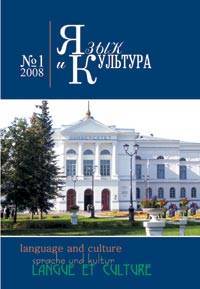Objectives, tasks, principles and content of study of military translators to the foreign language military discourse
The article examines the teaching of foreign-language professional discourse to military interpreters, which is necessary in response to the increasing demand for specialists of the military occupational specialty "Language Support of Military Activity" and the applicability of their education in military training centers at civilian higher education institutions. In turn, the above-mentioned factors as a whole along with the introduction of federal state educational standards for higher education require the development of a new approach to the training of such specialists in a civilian university. In this regard, in this article, the major purposes of foreign-language professional discourse teaching are formulated, consisting of improving the primary level of knowledge of a foreign language acquired at the previous stage of education and students' mastering of foreign-language communicative competence. These goals give an idea about the objectives of teaching: development of different types of speech competences, mastering of professional competence by a student while using a foreign language etc. The article reviews the main components of teaching according to the opinion of various academics. The components represent the basis of foreign-language teaching oriented at professional activity, and also components that are influenced by foreign-language professional discourse. The importance of proper selection of teaching content is substantiated. The importance of introducing discourse as an additional component in teaching content is demonstrated. The importance of military knowledge due to its ability to form a military interpreter's complex of competences, corresponding to the modern state of society, and the current technical and geopolitical situation, is emphasized. The necessity of paying attention to special aspects of servicemen's professional training and the necessity of including military learning into the content of military interpreters' education is shown; its components are formulated. The principles forming an educational model for military interpreters are thoroughly explored in the context of the professionally-oriented learning process, competence-based, cognitive and student-centered approaches. Namely, the principles of professional orientation, cognitive orientation, activity, communicativeness of interdisciplinary coordination, and the principle of phasing. In conclusion, the issue of creating a model for foreign-language professional (military) discourse teaching for military interpreters generally, and creation of a training and methodology complex in particular, which involves all the mentioned subjects, principles, objectives and conceptions of learning, is examined.
Keywords
военный перевод, иноязычный военный дискурс, компетентностный подход, когнитивный подход, личностно ориентированный подход, военная лексика, компетенция, фоновые знания, military translation, foreign language professional discourse, competency-based approach, cognitive approach, student-centered approach, military vocabulary, competency, background knowledgeAuthors
| Name | Organization | |
| Shevchenko M.A. | Tomsk State University | shefcomms@mail.ru |
| Gural S.K. | Tomsk State University | gural.svetlana@mail.ru |
References

Objectives, tasks, principles and content of study of military translators to the foreign language military discourse | Yazyk i Kultura – Language and Culture. 2017. № 40. DOI: 10.17223/19996195/40/24
